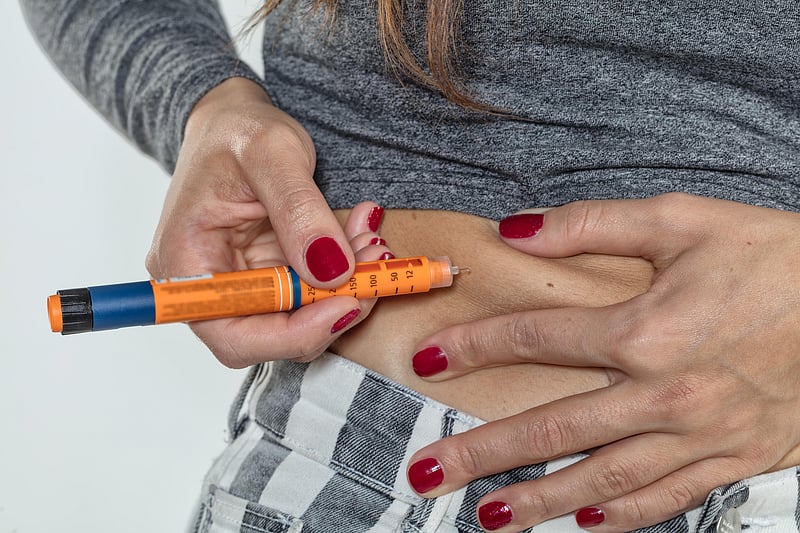Get Healthy!

- Dennis Thompson
- Posted July 17, 2023
Weekly Insulin Shot Could Be a Game Changer for Those With Type 2 Diabetes
People with type 2 diabetes could soon have access to convenient once-a-week insulin shots that could replace the daily injections now required.
A once-weekly insulin formulation called icodec performed just as well as daily doses of the insulin degludec, phase 3 clinical trial results show.
Icodec now awaits approval by the U.S. Food and Drug Administration based on these results, said lead researcher Dr. Ildiko Lingvay, an endocrinologist at UT Southwestern Medical Center in Dallas.
"This is the first product that's been developed as a weekly insulin, so we were, of course, very eager to see how it fares from an efficacy and safety standpoint compared with the current insulin,"she said. "And frankly, it's just as good. I think it's going to be a game changer."
More than 37 million Americans -- about 1 in 10 -- have diabetes, researchers said in background notes. About 95% of those cases are type 2 diabetes, in which the body develops insulin resistance.
About a third of people with type 2 diabetes take daily insulin injections to keep their blood sugar in a healthy range, researchers said.
But these daily shots are such a bother that there's an average three to five years of delay before people start taking their needed insulin, increasing the risk of long-term complications like heart disease, nerve damage, vision loss, and foot or leg amputations, researchers said.
"We know it's not fun,"Lingvay said. "It's a lot of work for patients. It interferes with their lives. It's complicated, and it comes with all sorts of hassles."
Icodec works as a time-release insulin by adhering to albumin, a protein in blood plasma, she said.
"It goes in the blood and then it attaches to albumin,"Lingvay said. "Then it sits in an inactive form circulating around the blood, and it releases at a constant pace throughout the week. You're basically creating a depot of inactive insulin that slowly releases to do its job."
To test its effectiveness, researchers recruited 564 people with type 2 diabetes who'd never been treated with insulin.
They were randomly assigned to take either once-weekly icodec along with a daily placebo, or daily injections of degludec accompanied with a weekly dose of a placebo.
Tests of hemoglobin A1C showed that the blood glucose levels improved about the same in both groups, with those taking icodec experiencing slightly better results after 26 weeks of treatment.
"There was a little bit greater lowering with the once-weekly insulin compared with the daily insulin,"Lingvay said. "It works just as well if not even better than the daily insulin."
Icodec works so well, in fact, that people taking it were more likely to experience a moderate to severe case of hypoglycemia (low blood sugar) compared to degludec, results show.
There were 53 episodes of moderate hypoglycemia in 26 icodec patients, versus 23 episodes in 17 degludec group.
However, there were no severe hypoglycemia episodes in icodec patients, compared with two in the degludec group.
None of the events was serious enough to require emergency medical attention, researchers said.
Icodec "lowered blood sugar better than daily insulin, and naturally that also means that some people had a higher risk of low blood sugar,"Lingvay said. "This wasn't unexpected, and it wasn't too serious."
She hopes to hear back from the FDA by the end of the year.
"If the FDA agrees with our assessment then, yes, next year this should be available,"Lingvay said.
Dr. Robert Gabbay, the American Diabetes Association's chief scientific and medical officer, said icodec promises "a less burdensome option"for diabetics that would be of "real value."
"One of the challenges for people living with diabetes who need to take daily insulin shots is remembering to do so consistently,"Gabbay said. "If they forget to stay consistent, their blood glucose levels could rise, putting them at significant risk for complications. A weekly insulin shot is likely to increase adherence and help the management of diabetes."
It will be easier to help treat stay-at-home seniors with diabetes, since a nurse would only have to stop by once a week for their insulin injection, Lingvay said.
It also will help flighty teenagers who have things on their mind other than insulin shots, as well as patients who struggle to maintain control of their blood sugar, she added.
"Everybody, I think, will be very excited to have this option for treatment,"Lingvay said. "If you would have to take insulin injections, and I would give you a choice of taking a shot a day or a shot a week, which one would you like?"
In fact, she said there was a bit of dejection among the icodec group when the phase 3 clinical trial wrapped up.
"Our patients were extremely positive about their experience in the trial, and quite disappointed at the end of the trial when they had to switch back to daily insulin, since this is not available clinically,"Lingvay said.
The clinical trial results were recently published in the Journal of the American Medical Association. The trial was funded by the Danish pharmaceutical company Novo Nordisk, which developed icodec.
More information
The Cleveland Clinic has more about insulin.
SOURCES: Ildiko Lingvay, MD, MPH, endocrinologist, UT Southwestern Medical Center, Dallas; Robert Gabbay, MD, PhD, chief scientific and medical officer, American Diabetes Association, Arlington, Va.; Journal of the American Medical Association, July 12, 2023







